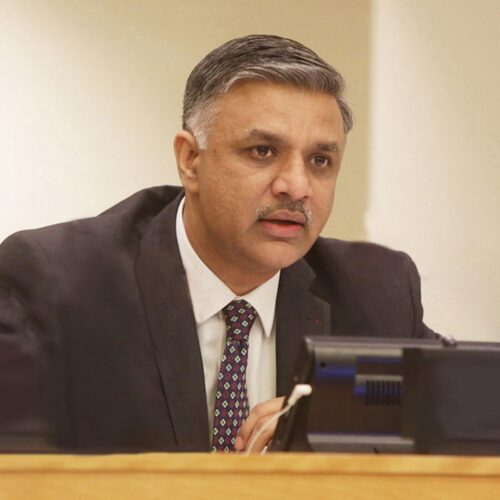
Background
The United Nations Office for South-South Cooperation (UNOSSC) plays a pivotal role in promoting and coordinating South-South and triangular cooperation globally, assisting Southern countries in strengthening their capacities to design and implement effective development cooperation policies and initiatives. Through its Strategic Framework 2022-2025, the UNOSSC aims to bolster these cooperative efforts, enhancing the capacity of Member States and the UN system to utilize South-South and triangular cooperation as a means of achieving the Sustainable Development Goals (SDGs). Among other major issues, the Strategic Framework focuses on financing, transferring, adapting, and co-designing solutions to address major developmental challenges, thereby accelerating progress towards Agenda 2030 for Sustainable Development.
Currently under development, the Global Report on South-South and Triangular Cooperation is an integral component of UNOSSC’s broader strategy to deepen the understanding and facilitate the practice of South-South and triangular cooperation globally. This report will seek to capture the evolving dynamics, key issues, and emerging trends in South-South and Triangular cooperation, with a particular focus on knowledge exchange, technology transfer, and capacity-building efforts that are crucial for developing countries facing global transformations such as COVID-19 recovery, digitalization, and climate change challenges. By offering in-depth analyses and highlighting successful examples of South-South and triangular cooperation, the report aims to serve as a valuable resource for policymakers, development practitioners, and stakeholders, informing and shaping the discourse on effective development cooperation. It also stimulates further research and policy development, providing a solid foundation for crafting tailored solutions that address the unique challenges and opportunities within the Global South.
The Advisory Board
- Identifying pressing policy issues pertinent to South-South Cooperation with precision and depth.
- Recommending topics and authors for background papers that enrich the report’s content as necessary.
- Providing strategic guidance on the report’s structure, methodology, and key messages, including direction for its further development.
- Reviewing the first, semi-final and final drafts of the report; providing guidance for the revision of chapters and offering constructive feedback to enhance its quality and impact.
- Participating in at least 3 meetings with fellow board members and the UNOSSC Knowledge Management team to discuss the report’s progress and direction. We are committed to utilizing digital platforms to facilitate these meetings, ensuring that all members can contribute effectively from anywhere in the world.
- Participating in the official launching of the report and subsequent activities to present its main findings.
- Advocating for the report’s findings and recommendations within your network and at relevant forums to maximize its reach and influence.
Sachin Chaturvedi

Karim El Aynaoui

Yuefen Li
Senior Advisor On South-South Cooperation And Development Finance, South Centre.
Yuefen Li is Senior Advisor on South-South Cooperation and Development Finance at the South Centre. Currently, she is involved in the finance track of the G20 work. She served as the UnitedNations Independent Expert on Foreign Debt and Human Rights. She is co-Chair of the Debt Relief for Green Recovery initiative.
She has worked in the United Nations Conference on Trade and Development for 24 years, and held various senior positions including Head of Debt and Development Finance and Senior Economic Affairs Officer. Before joining UNCTAD, she was a lecturer at the University of International Business & Economics in Beijing. She was a guest professor of TsinghuaUniversity. She has published books, papers and articles in refereed professional journals and newspapers on issues relating to debt, development strategies, South-South cooperation, finance, trade. She has contributed extensively to UNCTAD and South Centre publications and documents.

Elizabeth Sidiropoulos
Chief Executive, South African Institute Of International Affairs
Elizabeth Sidiropoulos is the chief executive of the South African Institute of International Affairs, which she has led since 2005. Her areas of expertise lie in South African foreign policy, Africa and external powers, global governance and south-south cooperation. Her most recent publications include co-edited volumes on Values, Interests and Power: South African Foreign Policy in Uncertain Times (2020), and The Palgrave Handbook of Development Cooperation for Achieving the 2030 Agenda (2021).
She is the editor-in-chief of the South African Journal of International Affairs, apolicy-oriented, peer-reviewed and interdisciplinary forum for discussion on Africa’s and South Africa’s international affairs. She is a regular commentator in South African and foreign media.
Elizabeth is a member of the board of the Network of Southern Think Tanks and co-convenor of the Think 20 Africa Standing Group, established in 2017 during the German presidency of the G20. She currently serves on the International Advisory Board of Brazil’s T20 Secretariat as well as on the UN’s High-Level Advisory Board on Economic and Social Affairs.

Laura Trajber Waisbich
Departmental Lecturer In Latin American Studies And Director Of The Brazilian Studies Programme, Oxford School Of Global And Area Studies
Dr Laura Trajber Waisbich is a Departmental Lecturer in Latin American Studies and Director of the Brazilian Studies Programme, at the Latin American Centre in the Oxford School of Global and Area Studies. She holds a PhD in Geography, from the University of Cambridge, and has over 10 years of experience working for civil society organizations and think tanks in Brazil and the United Kingdom.
Her work revolves around issues of foreign policy, international development cooperation, and citizen participation in policymaking. She is particularly interested in the growing role of rising powers countries like China, India, and Brazil in the current geopolitical landscape, particularly on issues related to global governance and development. Besides Oxford, she is a non-resident researcher at the Brazilian Centre for Analysis and Planning (Cebrap), the South-South Cooperation Research and Policy Centre (Articulação SUL), and the Igarapé Institute.

Riad Ragueb Ahmed
Director, Group General Secretariat, IsDB
Riad Ragueb is the Director, Group General Secretariat, at the Islamic Development Bank (IsDB) headquarters in Jeddah, Kingdom of Saudi Arabia. He has extensive experience in various areas such as South-South Cooperation (SSC), Regional Integration, Science and Technology, and Capacity Development. He played an instrumental role in promoting SSC and implementing Reverse Linkage, a technical cooperation mechanism introduced by the Bank to facilitate South-South and Triangular Cooperation among IsDB member countries.
He joined IsDB as a Young Professional in the year 2000 and served in different positions, including Operations Officer in the Office of the Vice President, Operations; Senior Operations Officer in the Technical Cooperation Office; Manager of the Reverse Linkage Division; Acting Director of the Regional Cooperation and Integration Department; and Director of the Cooperation and Capacity Development Department.
Before joining the Bank, he worked as a Programme Officer at UNDP for 3 years, in his home country of Djibouti. He holds a Master’s Degree in Development Economics from Paris Sorbonne University.

Sebastian Haug
Senior Researcher, German Institute Of Development And Sustainability (IDOS)
Dr Sebastian Haug is a Senior Researcher at the German Institute of Development and Sustainability (IDOS). He is interested in the politics of international organisations, North-South relations and global power shifts.
Sebastian has published in journals such as International Affairs, Global Governance and the Journal of International Development, as well as different United Nations outlets. He is the lead editor of “Power shifts in international organisations: China at the United Nations” (Global Policy, 2024) and “The ‘Global South’ in the study of world politics” (Third World Quarterly, 2021). Sebastian previously worked for the UN in China and Mexico, advises intergovernmental bodies on South-South cooperation, and co-hosts the Research Colloquium on Triangular Cooperation. He holds a Master’s degree from the University of Oxford and a PhD from the University of Cambridge.

Emma Mawdsley
Director, Margaret Anstee Centre For Global Studies, University Of Cambridge
Emma Mawdsley is Professor of Geography at the University of Cambridge, and Director of the Margaret Anstee Centre for Global Studies at Newnham College, Cambridge. Her research interests and publications are focused on the politics of global development. This includes UK aid policy, ‘South-South’ Cooperation (with a particular but not exclusive focus on India), and cross-cutting both of these, finance, financialisation and global development politics. Professor Mawdsley’s current work includes a major research project funded by the ESRC, which is evaluating the role of private consultants and contractors in planning and delivering the UK’s development work. In May 2021 Professor Mawdsley was awarded the Royal Geographical Society’s prestigious Busk Medal, “for exceptional engagements with fieldwork, research and knowledge production about the global South”.

Pedro Conceição
Director, Human Development Report Office, UNDP
Since 2019 Pedro has been Director of the Human Development Report Office and lead author of the Human Development Report. Prior to this, Pedro served as Director, Strategic Policy, at the Bureau for Policy and Programme Support (from October 2014), and Chief Economist and Head of the Strategic Advisory Unit at the Regional Bureau for Africa (from 1 December 2009).
Before that, he was Director of the Office of Development Studies (ODS) from March 2007 to November 2009, and Deputy Director of ODS, from October 2001 to February 2007. His work on financing for development and on global public goods was published by Oxford University Press in books he co-edited (The New Public Finance: Responding to Global Challenges, 2006; Providing Global Public Goods: Managing Globalization, 2003).
He has published on inequality, the economics of innovation and technological change, and development in, amongst other journals, the African Development Review, Review of Development Economics, Eastern Economic Journal, Ecological Economics, Environmental Economics and Policy Studies, Food Policy, and Technological Forecasting and Social Change. He co-edited several books including Innovation, Competence Building, and Social Cohesion in Europe- Towards a Learning Society (Edward Elgar, 2002) and Knowledge for Inclusive Development (Quorum Books, 2001).
Prior to coming to UNDP, he was an Assistant Professor at the Instituto Superior Técnico, Technical University of Lisbon, Portugal, teaching and researching on science, technology, and innovation policy. He has degrees in Physics from Instituto Superior Técnico and in Economics from the Technical University of Lisbon and a Ph. D. in Public Policy from the Lyndon B. Johnson School of Public Affairs at the University of Texas at Austin, where he studied with a Fulbright scholarship.

Debapriya Bhattacharya
Distinguished Fellow, Centre For Policy Dialogue (CPD)
Dr. Debapriya Bhattacharya is a Distinguished Fellow at the Centre for Policy Dialogue (CPD) in Dhaka, where he has previously served as its first Executive Director. He is a member of the UN Committee for Development Policy (CDP) and the Founding Chair of the LDC Monitor and Southern Voice. He was the Ambassador and Permanent Representative of Bangladesh to the WTO, UN Office, and other international organizations in Geneva and Vienna. He was the Special Adviser on LDCs to the Secretary General, UNCTAD. Earlier, he was a Senior Research Fellow at the Bangladesh Institute of Development Studies (BIDS). He is engaged in high-level policy design and advisory for the national government and various international development agencies in a number of developing countries. He serves in the boards and working groups of a number of national, regional, and international development organizations and networks and in the editorial board of reputed journals. He has published on pro-poor macroeconomics; post-2015 international development agenda; trade, investment and finance related issues of the LDCs. He holds a PhD in Economics from Plekhanov National Planning Institute, Moscow, and was a Post-Doctoral Fellow at Queen Elizabeth House, Oxford and Senior Fulbright Fellow at the Center for Global Development (CGD), Washington DC.

Justin Yifu Lin
Director, Institute Of New Structural Economics, Peking University
Justin Yifu LIN is Director of Center for New Structural Economics, Dean of Institute of South-South Cooperation and Development and Professor and Honorary Dean of National School of Development at Peking University. He was the Senior Vice President and Chief Economist of the World Bank, 2008-2012. Prior to this, Mr. Lin served for 15 years as Founding Director and Professor of the China Centre for Economic Research (CCER) at Peking University. He is a member of the Standing Committee, Chinese People’s Political Consultation Conference. He is the author of more than 30 books including Beating the Odd: Jump-starting Developing Countries; Going Beyond Aid: Development Cooperation for Structural Transformation, the Quest for Prosperity: How Developing Economies Can Take Off, New Structural Economics: A Framework for Rethinking Development and Policy, Against the Consensus: Reflections on the Great Recession, and Demystifying the Chinese Economy. He is a Corresponding Fellow of the British Academy and a Fellow of the Academy of Sciences for Developing World.

George Gray Molina
Chief Economist And Head Of Inclusive Growth, UNDP’s Global Policy Bureau
George Gray Molina (United Nations Development Programme) is Chief Economist and Head of the Inclusive Growth team at UNDP’s global policy bureau. Bolivian researcher and practitioner devoted to international development. Twenty years of experience in government, academia and the United Nations. Past policy research on poverty and inequality, social protection, labour markets as well as fiscal policy and political economy reforms. Currently, co-leading the UNDP Development Futures Series https://www.undp.org/undp-development-futures-series, exploring the challenges of green and just transitions in developing countries. On the UN team at the G20, focused on global economic trends, debt and finance for development.
Graduated from the University of Oxford (Dphil in Politics, Nuffield College), Harvard University (MPP in Public Policy) and Cornell University (BA in Economics and Anthropology). Post-Doc in Global Economic Governance at Princeton (School of Public and International Affairs) and Oxford (University College). Lectured at Columbia University’s School of International and Public Affairs (SIPA) and tutored at Oxford’s Latin American Centre (LAC).

Neissan Besharati
Director Of The Pan-African Financing For Development Institute
Prof. Neissan Besharati is the Director of the Pan-African Financing for Development Institute (PAFDI) and co-founder of the socio-ecological cooperative Sustainable Organic Urban Lifestyle (SOUL). He is a Senior Lecturer (Sustainability, ESG, Impact Management, Circular Economy) at the Gordon Institute of Business Sciences (GIBS), and Director for Policy & Partnerships at the Southern Centre for Indigenous Natural Psycho-Pharma at the University of Pretoria.
He holds a PhD (Public Policy & Development Management) from University of Witwatersrand (South Africa) and a Masters (International Social Development) from the University of New South Wales (Australia). He is as a senior research associate at several prominent development think-tanks and visiting professor at a number of international universities.
Neissan has extensive experience as an international consultant working with multinational corporations and serving as a senior policy advisor to governments, philanthropies, bi-lateral and multi-lateral donors, development finance institutions and regional organisations. He currently sits on various United Nations, World Bank, African Union and OECD expert groups and committees.
He is a globally respected thought leader in the areas of international development cooperation, monitoring and evaluation, impact measurement, development finance, sustainability and ESG, illicit financial flows, public-private partnerships, health and education policy, emerging economies and South-South cooperation.

Adedeji Adeniran
Director Of Research, Centre For The Study Of The Economies Of Africa
Dr. Adedeji Adeniran is currently the Director of Research at the Centre for the Study of the Economies of Africa (CSEA). He holds a PhD in Economics from the University of Witwatersrand, South Africa. His research covers a wide range of areas, including human capital development, Africa’s sustainable development challenges, and data governance. wide range of areas, including human capital development, Africa’s sustainable development challenges, and data governance. As a mixed-methods researcher, he has extensive experience in leading policy-oriented research projects that span multiple years and countries, all aimed at social and economic development in Africa. His approach to research is practical, and he is dedicated to translating research findings into effective policy practice through innovative policy engagement and capacity development.

Mma Amara Ekeruche
Senior Research Fellow, Centre For The Study Of The Economies Of Africa
Ms. Mma Amara Ekeruche is a Senior Research Fellow at the Centre for the Study of the Economies of Africa (CSEA), Nigeria’s premier economic think tank. In addition, she runs a column ‘Your Nigerian Economist’ on Stears Business, Africa’s leading business publication. She holds a Master’s in Economic Policy from University College London (UCL), United Kingdom and a Bachelor’s Degree in Economics from Kwame Nkrumah University of Science and Technology (KNUST), Ghana. Her research interests are public finance and debt management, domestic resource mobilization, and macroeconomic management. Consequently, her research experience cuts across key issues in development including public debt, South-South Cooperation, and the impact of Chinese investment in Africa. You can find her work on the Think20, Brookings Institution, the International Centre for Tax and Development, the United Nations Office on South-South Cooperation, and Southern Voice. She was also awarded the IMF Youth Fellowship in 2020.

The First Advisory Board Meeting
- When: 15 May 2024, 9:00 a.m. – 10:30a.m. EST
- Where: Virtual.
The first virtual meeting of the Global Report on South-South and Triangular Cooperation Advisory Board took place on 15 May 2024. The meeting provided a platform for UNOSSC and its partners to discuss the inception phase of the Global Report, set priorities and a way forward. The goal was to ensure the Report reflects the collaborative nature of South-South and triangular cooperation, and addresses the challenges, goals and priorities of partners on the ground.
Agenda
Moderator: Dumitru Vasilescu, Research Specialist, UNOSSC
1. Welcome remarks by Ms. Dima Al-Khatib, Director, UNOSSC
- South-South and Triangular Cooperation in the current global context
- Objectives of the Global Report
- Meeting objectives and role of the Advisory Board
2. Tour de table – Introduction of the Advisory Board members 3. Presentation of the inception phase of the Global Report by lead author, Mr. Adel Abdellatif
- Presentation of proposed methodology and key milestones
- Outline and proposed areas for research
- Presentation of key messages
4. Moderated discussion – Interactive review of inception Report
- Feedback from Board Members
- Recommendations for revisions and/or additions
5. Consensus on key points
- Agreement on major points and identification of any contentious issues
6. Planning forward
- Roadmap and timelines for the next phases of the report
- Frequency of future Board meetings
7. Closing remarks by Dima Al-Khatib, Director, UNOSSC
- Summary of decisions and action items
